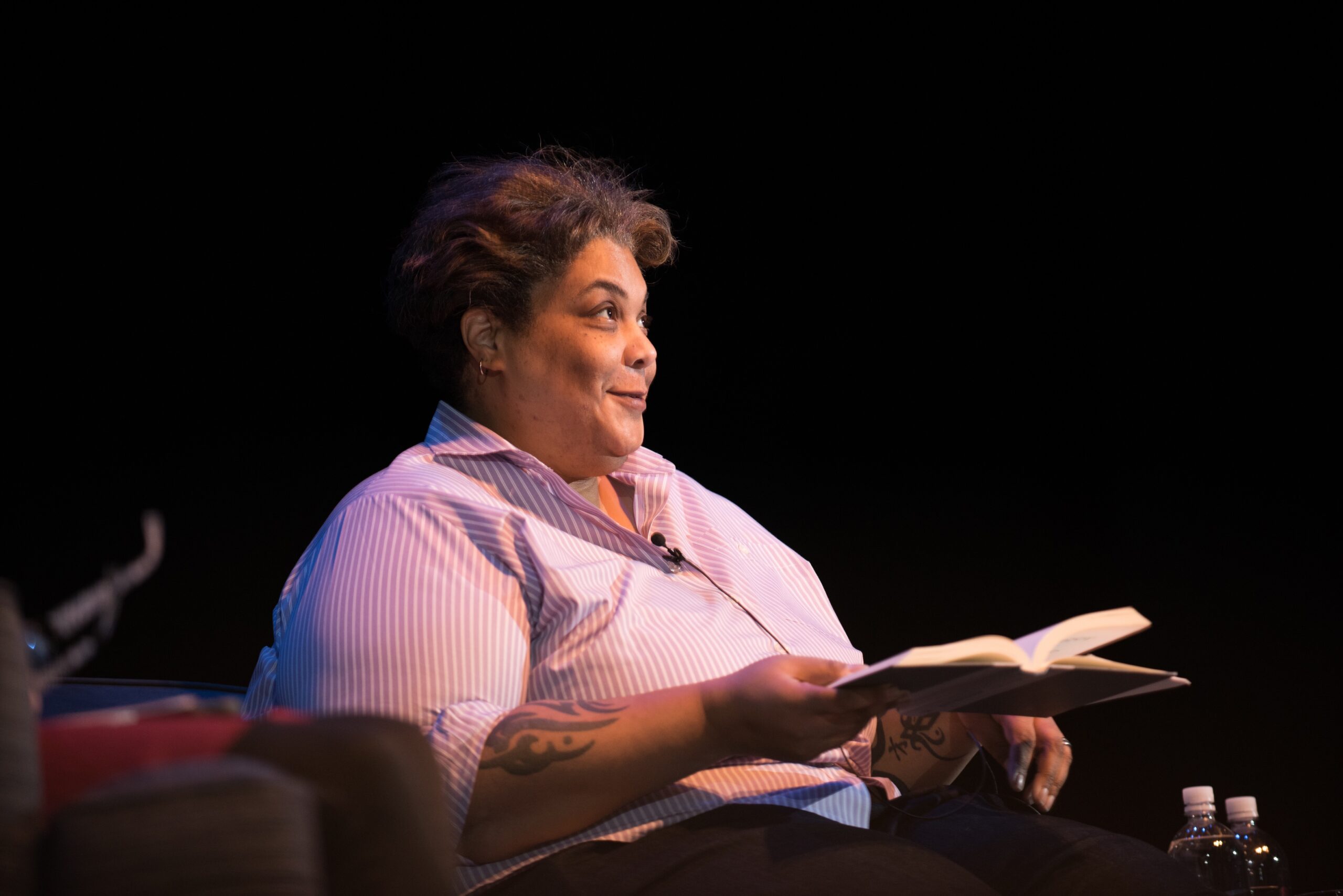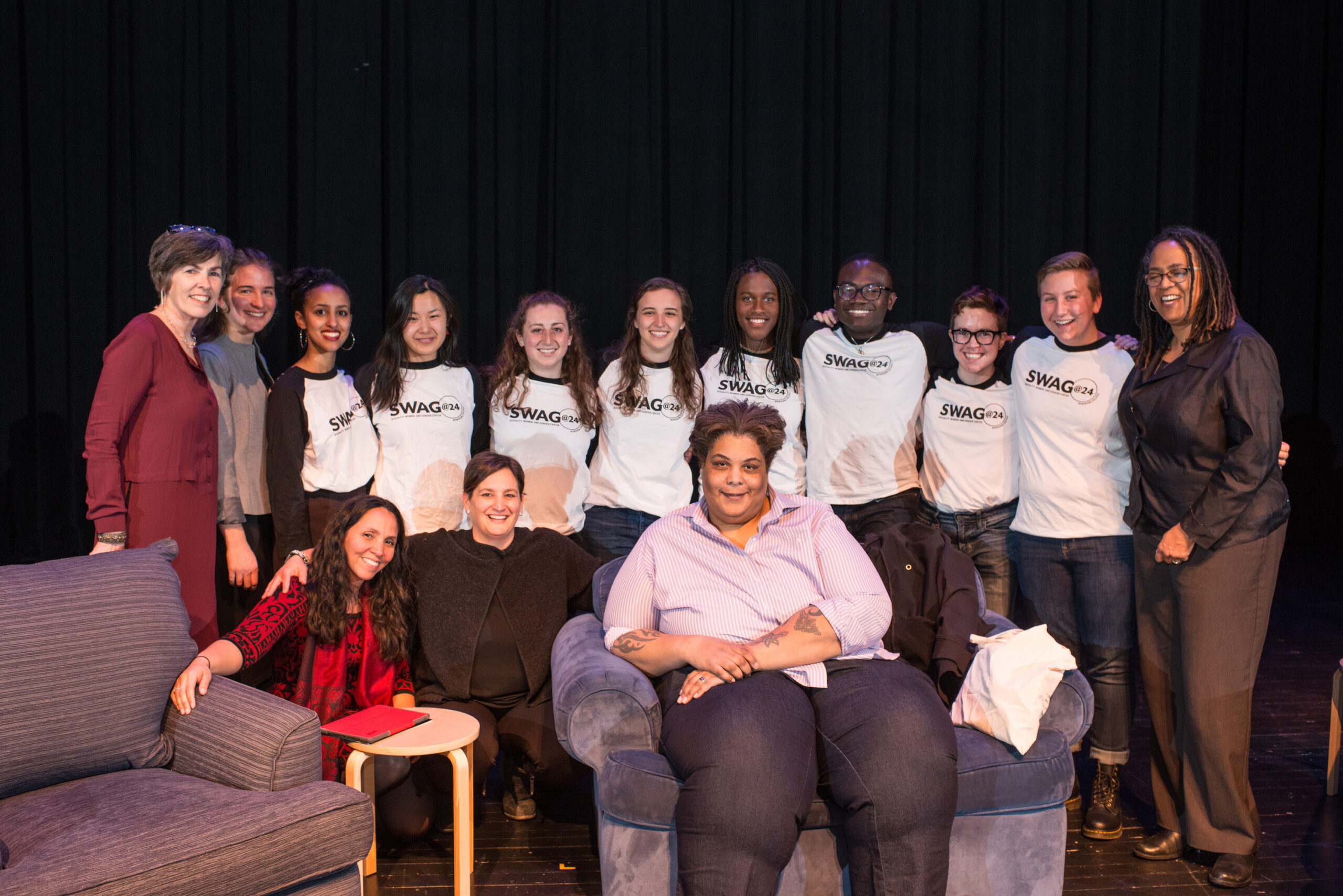Roxane Gay talks #metoo, Black Panther and imperfection
March 30, 2018

In the introduction to her book “Bad Feminist,” Roxane Gay accepts the moniker because she is “flawed and human,” but that she feels a responsibility to raise her voice “to show all the ways we have room to want more, to do better.” At Gay’s Monday night talk, the Bowdoin community proved anxious to listen to that voice.
Not only did the talk fill Pickard Theater, but a large crowd in Kresge Auditorium also watched Gay on livestream as she blended humor and gravitas discussing a wide range of topics such as body image, pop culture, feminism, social movements including #MeToo and her writing process.
Gay, the New York Times bestselling author of books including “Hunger: A Memoir of (My) Body” and “Bad Feminist,” began her talk by reading an excerpt of “Hunger,” a book she said was especially hard to write.
“As I was thinking ‘what do I want to write?’ I thought, ‘the thing I want to write about least is fatness,’” she said during her lecture. “And in that moment I realized, ‘Oh crap, the thing I need to write about is fatness.’ I’ve found throughout my career, the things that I’m most afraid of are the most intellectually satisfying.”
Gay demonstrated these same qualities in her talk—not shying away from topics such as the sexual assault she experienced as a 12 year-old, the effect it had on her body and the problems with the #MeToo movement.
“I think #MeToo is an important moment and I’m glad to see more attention and actual consequences, but it’s not enough,” Gay said. “I also resent this idea that women or anyone who has been a victim of sexual assault have to share our stories and that that is a moral responsibility, and that it’s for the greater good—that we have to cannibalize the worst things that have happened to us to increase awareness.”
According to several students, it was this honesty and fearlessness that made Gay’s talk so accessible.
“It’s just so wonderful to hear people who come from a background that isn’t privileged and to be able to relate to experiences they’ve had and to hear someone speak so thoughtfully and eloquently about their experiences and just know that you’re not alone in that,” said Sophie Sadovnikoff ’19.
Gay, who wrote “World of Wakanda” for Marvel Comics, also discussed many aspects of pop culture, including intersectionality and identity in “Black Panther,” noting the lack of happy endings for LGBTQ characters.
“At one point, Erik Killmonger kills his girlfriend point blank,” Gay said. “And that’s okay to the Disney viewer, but two women loving each other is not? So I think we need to think about what our cultural threshold for queerness is and that we are more comfortable with murder than we are with queerness.”
Gay also pushed back against the refrain that “Black Panther” was one of the first movies to provide black heroes.
“The idea that black people haven’t had heroes before this movie is horrible, it’s offensive,” she said. “It’s offensive that people think that we are desperate. We aren’t desperate for heroes, we’re desperate for representation.”
Leana Amaez, associate dean of students for diversity and inclusion and the co-director of the Sexuality, Women and Gender Center, believes that Gay’s wide range references to pop culture and other novels and writings demonstrates the empirical value of knowledge.
“[Gay’s] ability to pull from popular culture—to pull from literature and then to create arguments and shed light on things that are right in front of us, about our own society, about our own selves but that we aren’t seeing yet in a particular way, or to get us to see them in any way, that comes from a certain degree of knowledge,” Amaez said. “That doesn’t just come from being an opinionated person, it’s based in some real knowledge.”
Gay used another pop culture reference, ABC’s “The Bachelor,” to describe her views on imperfection, a theme that Amaez believes is another important takeaway.
“ABC has decided to get rid of morality and ethics and there I was watching and being implicated in their lack of ethics,” Gay said. “I thought [the most recent season finale] was a new low in reality television … I felt like it was such an intimate and painful moment and I watched it. I watched it because it was voyeuristic and it was interesting. But I think we have to ask ourselves, how much pain do we have to consume because it’s entertaining?”

This contradiction is similar to what Gay talks about when she discusses being a “bad feminist.” Amaez believes that this ability to be imperfect but still be a good person is an important message for students to remember.
“I think we live in a world and maybe a culture particularly in higher ed, particularly at Bowdoin where our students are so high achieving and really want to get it right,” Amaez said. “And I don’t mean that—I’m not talking about just getting good grades—I’m talking about wanting to do good, by their peers, by their families, by their communities and they want to do it right. It’s one of the great things about Bowdoin students right?”
“But I think her message is that you can do it right and still sometimes get it a little wrong,” she continued. “That you can be a complicated person.”

Comments
Before submitting a comment, please review our comment policy. Some key points from the policy: